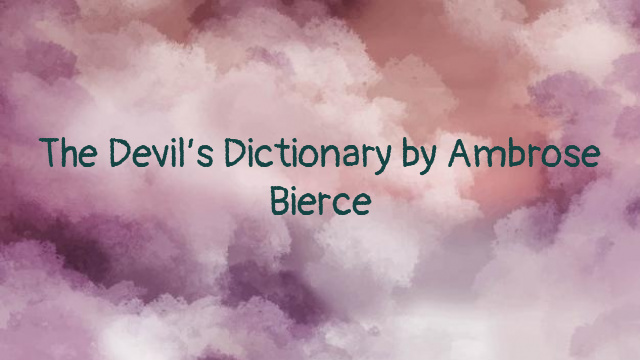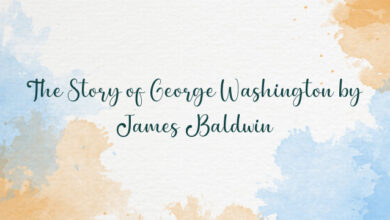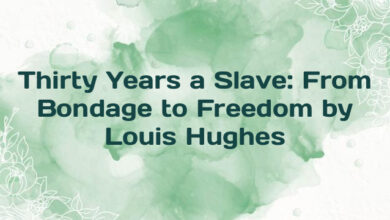
The Devil’s Dictionary by Ambrose Bierce
Originally published as The Cynic’s Word Book, Ambrose Bierce’s wickedly satirical “reference book” was retitled The Devil’s Dictionary in 1911.
Preface
The Devil’s Dictionary was begun in a weekly paper in 1881, and was continued in a desultory way at long intervals until 1906. In that year a large part of it was published in covers with the title The Cynic’s Word Book, a name which the author had not the power to reject or happiness to approve. To quote the publishers of the present work: “This more reverent title had previously been forced upon him by the religious scruples of the last newspaper in which a part of the work had appeared, with the natural consequence that when it came out in covers the country already had been flooded by its imitators with a score of ‘cynic’ books — The Cynic’s This, The Cynic’s That, and The Cynic’s Other. Most of these books were merely stupid, though some of them added the distinction of silliness. Among them, they brought the word “cynic” into disfavor so deep that any book bearing it was discredited in advance of publication. Meantime, too, some of the enterprising humorists of the country had helped themselves to such parts of the work as served their needs, and many of its definitions, anecdotes, phrases and so forth, had become more or less current in popular speech. This explanation is made, not with any pride of priority in trifles, but in simple denial of possible charges of plagiarism, which is no trifle. In merely resuming his own the author hopes to be held guiltless by those to whom the work is addressed — enlightened souls who prefer dry wines to sweet, sense to sentiment, wit to humor and clean English to slang. A conspicuous, and it is hope not unpleasant, feature of the book is its abundant illustrative quotations from eminent poets, chief of whom is that learned and ingenius cleric, Father Gassalasca Jape, S.J., whose lines bear his initials. To Father Jape’s kindly encouragement and assistance the author of the prose text is greatly indebted.
A lady with one of her ears applied
To an open keyhole heard, inside,
Two female gossips in converse free --
The subject engaging them was she.
"I think," said one, "and my husband thinks
That she's a prying, inquisitive minx!"
As soon as no more of it she could hear
The lady, indignant, removed her ear.
"I will not stay," she said, with a pout,
"To hear my character lied about!"
Gopete Sherany
O, the Lord of Law on the Throne of Thought,
A gilded impostor is he.
Of shreds and patches his robes are wrought,
His crown is brass,
Himself an ass,
And his power is fiddle-dee-dee.
Prankily, crankily prating of naught,
Silly old quilly old Monarch of Thought.
Public opinion's camp-follower he,
Thundering, blundering, plundering free.
Affected,
Ungracious,
Suspected,
Mendacious,
Respected contemporaree!
J.H. Bumbleshook
Megaceph, chosen to serve the State
In the halls of legislative debate,
One day with all his credentials came
To the capitol's door and announced his name.
The doorkeeper looked, with a comical twist
Of the face, at the eminent egotist,
And said: "Go away, for we settle here
All manner of questions, knotty and queer,
And we cannot have, when the speaker demands
To be told how every member stands,
A man who to all things under the sky
Assents by eternally voting 'I'."
"Monsieur Franqulin, inventor of electricity. This
illustrious savant, after having made several voyages around the
world, died on the Sandwich Islands and was devoured by savages,
of whom not a single fragment was ever recovered."
Electricity seems destined to play a most important part in the arts and industries. The question of its economical application to some purposes is still unsettled, but experiment has already proved that it will propel a street car better than a gas jet and give more light than a horse.
The cur foretells the knell of parting day;
The loafing herd winds slowly o'er the lea;
The wise man homeward plods; I only stay
To fiddle-faddle in a minor key.
The cur foretells the knell of parting day;
The loafing herd winds slowly o'er the lea;
The wise man homeward plods; I only stay
To fiddle-faddle in a minor key.
He was a slave: at word he went and came;
His iron collar cut him to the bone.
Then Liberty erased his owner's name,
Tightened the rivets and inscribed his own.
G.J.
The man was perishing apace
Who played the tambourine;
The seal of death was on his face --
'Twas pallid, for 'twas clean.
"This is the end," the sick man said
In faint and failing tones.
A moment later he was dead,
And Tambourine was Bones.
Tinley Roquot
Enough is as good as a feast -- for that matter
Enougher's as good as a feast for the platter.
Arbely C. Strunk
We know better the needs of ourselves than of others. To
serve oneself is economy of administration.
In each human heart are a tiger, a pig, an ass and a
nightingale. Diversity of character is due to their unequal
activity.
There are three sexes; males, females and girls.
Beauty in women and distinction in men are alike in this:
they seem to be the unthinking a kind of credibility.
Women in love are less ashamed than men. They have less to be
ashamed of.
While your friend holds you affectionately by both your hands
you are safe, for you can watch both his.
Here lie the bones of Parson Platt,
Wise, pious, humble and all that,
Who showed us life as all should live it;
Let that be said -- and God forgive it!
So wide his erudition's mighty span,
He knew Creation's origin and plan
And only came by accident to grief --
He thought, poor man, 'twas right to be a thief.
Romach Pute
Hail, high Excess -- especially in wine,
To thee in worship do I bend the knee
Who preach abstemiousness unto me --
My skull thy pulpit, as my paunch thy shrine.
Precept on precept, aye, and line on line,
Could ne'er persuade so sweetly to agree
With reason as thy touch, exact and free,
Upon my forehead and along my spine.
At thy command eschewing pleasure's cup,
With the hot grape I warm no more my wit;
When on thy stool of penitence I sit
I'm quite converted, for I can't get up.
Ungrateful he who afterward would falter
To make new sacrifices at thine altar!
This "excommunication" is a word
In speech ecclesiastical oft heard,
And means the damning, with bell, book and candle,
Some sinner whose opinions are a scandal --
A rite permitting Satan to enslave him
Forever, and forbidding Christ to save him.
Gat Huckle
LUNARIAN: Then when your Congress has passed a law
it goes directly to the Supreme Court in order that it may at
once be known whether it is constitutional?
TERRESTRIAN: O no; it does not require the approval of the
Supreme Court until having perhaps been enforced for many
years somebody objects to its operation against himself -- I
mean his client. The President, if he approves it, begins to
execute it at once.
LUNARIAN: Ah, the executive power is a part of the legislative.
Do your policemen also have to approve the local ordinances
that they enforce?
TERRESTRIAN: Not yet -- at least not in their character of
constables. Generally speaking, though, all laws require the
approval of those whom they are intended to restrain.
LUNARIAN: I see. The death warrant is not valid until signed by the murderer.
TERRESTRIAN: My friend, you put it too strongly; we are not so consistent.
LUNARIAN: But this system of maintaining an expensive judicialmachinery to pass upon the validity of laws only after they
have long been executed, and then only when brought before the
court by some private person -- does it not cause great
confusion?
TERRESTRIAN: It does.
LUNARIAN: Why then should not your laws, previously to being executed, be validated, not by the signature of your
President, but by that of the Chief Justice of the Supreme
Court?
TERRESTRIAN: There is no precedent for any such course.
LUNARIAN: Precedent. What is that?
TERRESTRIAN: It has been defined by five hundred lawyers in three volumes each. So how can any one know?
Aug. 3d, 1842. Made a joke on the ex-Isle of Erin. Coldly received. War with the whole world!
A transient, horrible, fantastic dream,
Wherein is nothing yet all things do seem:
From which we're wakened by a friendly nudge
Of our bedfellow Death, and cry: "O fudge!"
To one who, journeying through night and fog,
Is mired neck-deep in an unwholesome bog,
Experience, like the rising of the dawn,
Reveals the path that he should not have gone.
Joel Frad Bink




